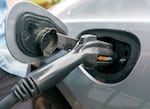Oregon is looking to increase the number of public fast-charging electric vehicle stations across the state, through a federal grant program.
The Oregon Department of Transportation received $52 million through the National Electric Vehicle Infrastructure Program to use over the next five years. The program aims to create a better network of public DC fast chargers, which can take an electric vehicle from zero to 80% charged in about 20 minutes, throughout frequently used highway corridors.

FILE: A hybrid vehicle is electrically charged.
Kristyna Wentz-Graff / OPB
Brett Howell, ODOT’s transportation electrification coordinator, said the state agency recently opened its first round of funding to 19 pre-qualified EV charging companies.
“We expect to award somewhere between $7.5 and $12 million in federal funding,” he said, “with a private match of up to $3 million for a total of $15 million available in this round.”
The companies will focus on creating fast charging stations on Interstate 205 in the Portland area, Interstate 5 south of Eugene and U.S. Highway 97. They are also expected to install, own and maintain the EV charging infrastructure.
Electric vehicle sales in Oregon have been steadily increasing. More than 89,000 electric vehicles are registered, according to the state Department of Transportation. The state offers two electric vehicle rebates, one based on income, that have helped boost sales, so much so that the rebate program has run out of funding two years in a row.
But access to fast chargers for electric vehicles has been limited in certain areas across Oregon. The federally funded program could help create more fast-charging stations, with at least two chargers per station. That would help electric vehicles drivers avoid running out of battery charge before reaching their destinations and could help encourage more people to transition from gas-powered to electric cars.
Currently, there is a lack of fast chargers throughout the state, with about 900 available to the public, Howell said. He expects the program to add 65 stations. That could potentially add about 260 additional fast chargers over the next five years.
The companies pre-qualified to can apply to build these EV chargers represent some of the largest charging manufacturers, operations and maintenance providers across the country, Howell said.
“We felt that, because Oregon is such a geographically diverse state with a lot of rural charging deserts, we were concerned that maybe some of those places wouldn’t actually receive applications,” Howell said. “So, we chose to go about this by requiring all of our applicants to propose to develop the full corridor, not just individual sites.”
When selecting which companies will build the new stations, Howell said, ODOT will also award more points to applications that indicate they will build out additional chargers at these sites.
“We’re trying to find the partner who is the most ready to go ahead and build these,” he said.
EV charging companies will have until Aug. 9 to apply. The agency expects to award funding before the end of 2024.
A second round of funding is expected to begin next year. ODOT expects to invest in EV charging stations through at least four rounds of funding over the next five years.
The National Electric Vehicle Infrastructure Program funding comes from the federal 2021 Bipartisan Infrastructure Law.
$10 million for EV maintenance
Earlier this year, ODOT received a $10 million federal grant to repair or replace broken public EV charging ports throughout the state. The funds can also be used to install more fast chargers at certain sites.
There are currently more than 3,300 public charging ports throughout Oregon.
According to the Federal Highway Administration, 135 public charging stations in Oregon have at least one broken EV charging port, either Level 2 or DC fast chargers, that are eligible for repairs through the funding.
Howell said that, because the state of Oregon was an early adopter for EV chargers, many of the state’s EV charging ports are more than 10 years old.
“They were left to fall into disrepair and just not maintained,” he said.
The funding comes with operation and maintenance requirements for a minimum of five years, Howell said, but ODOT is looking at ways to encourage applicants to maintain chargers for a 10-year period.
ODOT says repairs could start by the end of the year.
